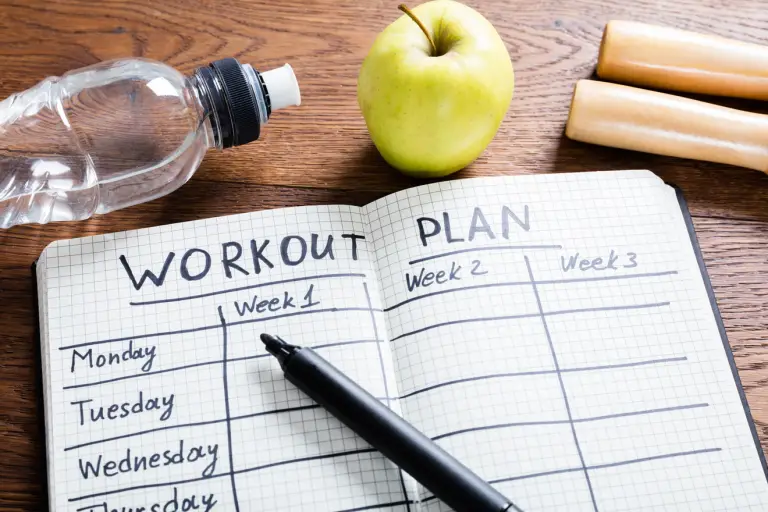Essential nutrition tips for building muscles
Key takeaways
- Protein provides amino acids your muscles need to recover from a workout. It is ideal to consume protein 30-60 minutes after training.
- Consuming carbohydrates after a workout can replenish your glycogen stores which is important in muscle recovery.
- Fats can affect hormone levels and play a role in vitamin absorption. Healthy fats should take up about 20% of your diet.
- Stay hydrated and make sure to take your vitamins.
- If you really want muscle gains, make sure you have a calorie surplus (you’re eating more than you’re burning).
Another approach to building muscle
Building muscle isn’t just about lifting heavy weights in the gym. In fact, a major part of muscle growth happens outside the gym, particularly in the kitchen. Nutrition plays a vital role in your ability to build, repair, and grow muscle effectively. Without the proper fuel and nutrients, your hard work in the gym may not yield the gains you’re striving for.
To grow muscle like a pro, you need to understand how to eat strategically. Whether you’re just starting your muscle-building journey or looking to refine your current diet, these essential nutrition tips will guide you toward better muscle gains and faster recovery.
Understanding the muscle-building process
Before diving into specific nutrition strategies, it’s important to understand how muscle growth, or hypertrophy, works. When you lift weights, you create micro-tears in your muscle fibers. These tears signal your body to repair and rebuild the muscles, making them stronger and bigger in the process.
For this repair and growth to occur, your body needs three primary ingredients: sufficient calories, the right balance of macronutrients (proteins, carbs, and fats), and adequate micronutrients (vitamins and minerals). The combination of these elements ensures that your muscles have the energy, building blocks, and recovery support they need.
Why and when to consume protein?
Protein is the king of muscle-building nutrition. It provides the amino acids your body needs to repair damaged muscle fibers and create new ones. Without sufficient protein intake, your muscles will struggle to grow even if you’re putting in maximum effort in the gym.
For muscle growth, aim to consume lean protein sources like chicken breast, turkey, lean beef, eggs, and plant-based options such as tofu, tempeh, and legumes. These protein sources should form the foundation of your diet.
In addition to your total daily protein intake, the timing of your protein consumption also matters. Consuming protein-rich meals or snacks evenly throughout the day ensures a steady supply of amino acids to your muscles. A post-workout protein shake or meal within 30-60 minutes after training can help kickstart the recovery process.
What about carbohydrates?
Carbohydrates are often misunderstood when it comes to muscle building, with some people fearing they’ll cause fat gain. However, carbs are essential for providing the energy your body needs to perform intense workouts and recover effectively.
When you lift weights, your muscles use glycogen (stored carbs) as their primary fuel source. After a workout, your glycogen stores are depleted and need to be replenished. Eating carbohydrates post-workout helps replenish glycogen stores, promoting faster recovery and preventing muscle breakdown.
Aim to consume complex carbohydrates such as oats, brown rice, quinoa, sweet potatoes, and whole grains to fuel your workouts and keep your energy levels stable. For muscle building, your carbohydrate intake should make up about 45-55% of your total daily calories.
If you’re training intensely, don’t be afraid to consume carbohydrates before and after your workouts to optimize performance and recovery. Carbs combined with protein create a powerful recovery duo that supports muscle repair and growth.
Fats: the hormonal support for growth
Healthy fats are another key component of a muscle-building diet, particularly because they support hormone production. Testosterone and other anabolic hormones play a critical role in muscle growth, and adequate fat intake is essential to keep these hormones at optimal levels.
While fats should make up a smaller portion of your daily calorie intake compared to protein and carbs, they should not be neglected. Aim to get about 20-30% of your total daily calories from healthy fat sources such as avocados, nuts, seeds, olive oil, and fatty fish like salmon and mackerel.
These fats not only support hormone production but also provide energy and aid in the absorption of fat-soluble vitamins (A, D, E, and K), which are crucial for muscle recovery and overall health.
Water and muscles
Hydration is often overlooked, but it’s a critical factor in muscle building. Muscles are made up of about 75% water, and proper hydration ensures that your muscles can perform optimally during workouts and recover efficiently afterward.
Dehydration can lead to decreased strength, endurance, and overall performance, making it harder to lift heavy and push yourself in the gym. Drink water consistently throughout the day, and make sure to hydrate before, during, and after your workouts. If you’re sweating heavily during training, consider adding an electrolyte-rich drink to replenish lost minerals.
A good rule of thumb is to drink at least 3-4 liters of water daily, adjusting based on your activity level and climate. Staying hydrated will keep your muscles functioning properly and support the nutrient delivery needed for growth.
Don’t skip micronutrients
While macronutrients like protein, carbs, and fats often take center stage, micronutrients—vitamins and minerals—are just as important for muscle growth. These nutrients help regulate bodily functions, including muscle contraction, recovery, and repair.
For example, magnesium supports muscle relaxation and prevents cramps, while zinc plays a role in testosterone production. Vitamin D is critical for bone health and muscle function, and B vitamins help convert food into energy that powers your workouts.
To ensure you’re getting all the essential vitamins and minerals, eat a varied diet rich in fruits, vegetables, and whole foods. Dark leafy greens, berries, nuts, seeds, and lean meats are all excellent sources of the micronutrients your body needs for muscle growth.
Create a calorie surplus
To build muscle, you need to be in a calorie surplus, meaning you consume more calories than your body burns in a day. Without a surplus, your body won’t have the extra energy required to build new muscle tissue, and your gains will stall.
However, the goal is to achieve a lean bulk, not gain excessive fat. Aim for a moderate calorie surplus of 250-500 calories above your maintenance level. This allows for steady muscle growth without piling on too much body fat.
Track your progress and adjust your calorie intake based on how your body responds. If you’re not gaining muscle, increase your calories slightly. If you’re gaining too much fat, reduce the surplus until you find the sweet spot for muscle growth.
The key to long term results
When it comes to building muscle, consistency in both your training and nutrition is crucial. Eating the right foods in the right amounts, day in and day out, will produce long-term results. Muscle growth takes time, so be patient with the process and trust that your efforts in the kitchen will translate into gains in the gym.
Stay focused on eating whole, nutrient-dense foods that support your muscle-building goals. Over time, these nutrition habits will help you grow stronger, bigger, and leaner, just like the pros.
Muscle building is more than weight training
Building muscle requires more than just hitting the weights—it demands a well-structured nutrition plan that fuels your body and supports recovery. By prioritizing protein, incorporating the right amount of carbs and fats, staying hydrated, and ensuring you’re in a calorie surplus, you’ll be setting the stage for optimal muscle growth.
With these essential nutrition tips for building muscles like a pro, you’ll be well on your way to achieving your strength and physique goals. Eat smart, train hard, and watch your body transform.
Written with the assistance of AI. Reviewed and edited by: Marielle Livelo.







